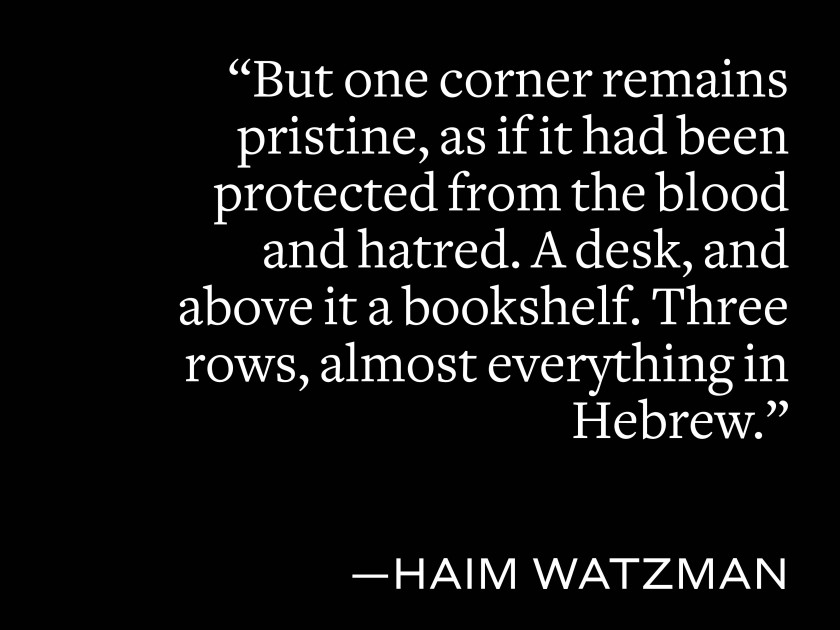
This piece is one of an ongoing series that we will be sharing in the coming days from Israeli authors and authors in Israel.
It is critical to understand history not just through the books that will be written later, but also through the first-hand testimonies and real-time accounting of events as they occur. At Jewish Book Council, we understand the value of these written testimonials and of sharing these individual experiences. It’s more important now than ever to give space to these voices and narratives.
In collaboration with the Jewish Book Council, JBI is recording writers’ first-hand accounts, as shared with and published by JBC, to increase the accessibility of these accounts for individuals who are blind, have low vision or are print disabled.
Just one house in Kibbutz Be’eri. Walls pocked by gunfire and shrapnel from the grenades of the Hamas attackers. Drawers and closets left open, their contents cast on the floor; ransacked by the looters who followed the murderers. Walls and ceilings covered in the soot left by the fire set by the slaughterers. A metal staircase twisted and windows blown out, probably when the IDF shelled the houses to kill the invaders, when it was clear there was no Israeli soul alive. Furniture toppled over, piled up, cast aside, presumably by those who came later, to search for the bodies, identify them, and prepare them for burial.
But one corner remains pristine, as if it had been protected from the blood and hatred. A desk, and above it a bookshelf. Three rows, almost everything in Hebrew. On the bottom shelf, Hebrew translations of Ian McEwan’s Atonement and of John Le Carré’s Our Game. On the middle shelf, mostly Hebrew fiction — Yoram Kaniuk’s The Second Book of David and Merav Halperin’s Over My Dead Body.
In a house nearby, a bookcase in a room where a child was murdered in bed (the slaughter began early Saturday morning, when they were still sleeping). Leah Goldberg’s Garden of Stars, and another, Something Else, whose author’s name I cannot make out because it’s blocked by debris. A Google search later identifies her as Kathryn Cave and the illustrator as Chris Riddel. For this book they won the first international UNESCO prize for Children’s and Young People’s Literature in the Service of Tolerance.
At the adjacent Re’im campsite,(the site of the nature party), families fled from their tents to their cars when mortar shells began falling at dawn. Gunfire came from all directions and the Hamas attackers burned some of them alive in their cars. Left behind were pages from activity books they had brought along for their young children, scattered by their tents or dropped in their flight. One is a drawing of a pastoral lawn with a fruit tree, with instructions for kids to search for hidden items that you would expect to find in your backyard.
At Kfar Aza, the attackers broke through the kibbutz’s back gate, assailing three rows of older apartments that were rented by students and other young people. On a bloodstained bed lay Nobody’s Children, a book of poems by Yehuda Atlas based on interviews he conducted with children at risk from broken families, or with no families at all.
A musician’s apartment. Electronic keyboard, sound equipment. On the bookshelf above all this, Hebrew translations of Alice Munro’s Something I’ve Been Meaning to Tell You and Philip Roth’s Goodbye, Columbus, Yoni Rechter’s Twenty Songs from Five Decades. On the keyboard, Bach etudes.
The books on the top shelf of the three rows of volumes in the island of serenity in that gutted hell in Be’eri have toppled over to the left. Perhaps when the house shook from explosions. Or perhaps, the night before, a woman had sat there, writing, as I am writing now, had recalled a phrase she wanted to quote and had stretched her arm up to retrieve a book. And the books toppled over when she did that and, because it was after a family holiday dinner, and she’d had maybe a bit too much wine, she was too tired to right the books. She’d deal with it in the morning. On the right, Aviad Kleinberg’s album-style history of Israel’s first fifty years, Resurrection. In the middle, Boccaccio’s Decameron. On the left, leaning over the edge, as if about to plummet into Inferno, a well-worn, black-bound volume with silver lettering on the spine: Torah. Nevi’im. Ketuvim.
The views and opinions expressed above are those of the author, based on their observations and experiences.
Support the work of Jewish Book Council and become a member today.
Haim Watzman lives in Jerusalem and is the author of three books: Company C: An American’s Life as a Citizen-Soldier in Israel; A Crack in the Earth: A Journey Up Israel’s Rift Valley; and a story collection, Necessary Stories, a selection of the more than 150 he has written. His play The Chair won the 2021 Theater Institute Award of the Contemporary Jewish Drama International Competition sponsored by the Estera Rachel and Ida Makinskie Jewish Theater in Warsaw. He has translated more than 50 books from Hebrew into English, among them works by Shlomo Avineri, David Grossman, Hillel Cohen, Amos Oz, and Tom Segev. He edited the English-language version of Yuval Noah Harari’s worldwide bestseller, Sapiens. Subscribe to his Substack newsletter here.